Japanese LED manufacturers that attended EcoLightTech Asia 2014 recently in Bangkok, Thailand were mostly new players in the Thai LED lighting market. Of the four Japanese LED manufacturers LEDinside interviewed, three companies including Sharp had only been in the industry for one year.
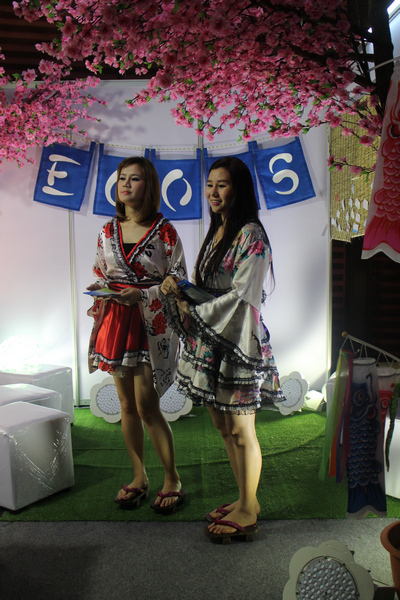 |
|
Newcomer in the Thai LED market, ECOTS, attracts attention at its booth with showgirls dressed in modern kimonos. (LEDinside) |
Focus on Japanese manufacturers factory lighting demands in Thailand
An interesting trend among Japanese lighting manufacturers were their unanimous focus on the industrial lighting market, and similar business strategies of targeting Japanese manufacturers factory lighting demands in Thailand. Their focus on this particular sector was revealed from high bay LED lighting products highlighted at show booths.
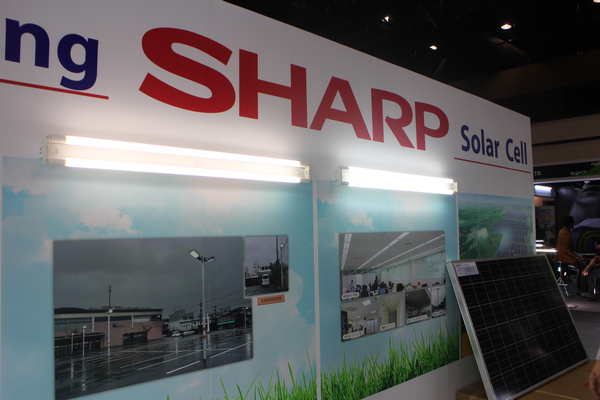 |
|
Sharp's LED tube lights displayed at EcoLightTech Asia 2014. (LEDinside) |
“We are focusing on Japanese customers because our product prices are higher than local manufacturers, and cannot compete with them price-wise,” said Sakesom Phupa, General Manager, Solar Systems Sales Division and LED, Sharp Thai.
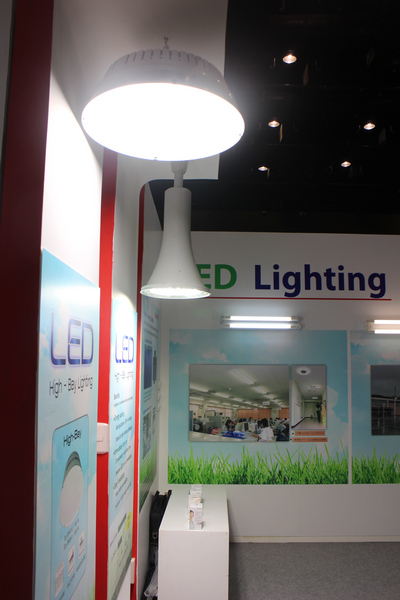 |
|
Sharp's high bay LED lights attracted a lot of inquiries at the trade show. The high bay model in the front, which comes in two models DL-0HA1U/100 W and DL-0HB1U/ 200W are imported from the group's Taiwan branch. (LEDinside) |
Companies from Japan are avoiding price slashing strategies, since most have chosen to design, manufacture and import the end-product directly from Japan, leading to the higher retail price. Sharp for example imports finished LED luminaires mostly from Japan, and only uses Japanese LED components in its products, said Phupa. For certain high bay LED products, the company imports from Sharp Taiwan, he added.
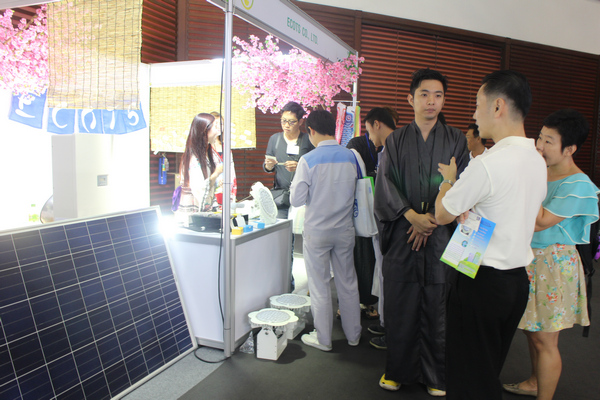 |
|
ECOTS showcases its floral shaped ECW4422S 100W industrial lights for both indoor and outdoor applications at the trade show. (LEDinside) |
Another Japanese manufacturer, ECOTS, which has only been in the Thai LED industry for two months, manufacturers lighting products in Japan, said Yuji Nakazawa, General Manager, Sales Department, ECOTS. The company, which transformed from being a trader in Thailand for 15 years to LED manufacturer, incorporates Nichia LED chips and drivers manufactured in Osaka Prefecture, Japan industrial LED lights ECW 44 22PS.
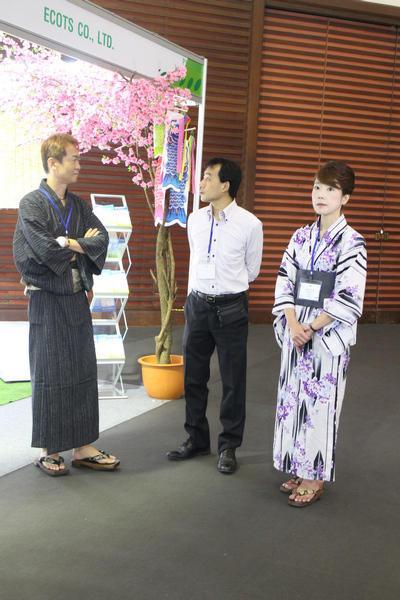 |
|
Yuji Nakazawa, General Manager, Sales Department, ECOTS (left) and company employees at EcoLightTech Asia 2014. (LEDinside) |
Special product designs to rise above competition
Two other Japanese manufacturers surveyed are trying to outperform competition by offering innovative products or services. Niinuma, a Japanese LED manufacturer that has been a high bay LED light OEM for many Japanese lighting brands, showcased very compact product designs. By using a special resin developed by Raheama, the company has been able to reduce the weight for 1,000 W high bay LED lights to mere 6 kilograms, said Gary Hung, Branch Manager, Niinuma.
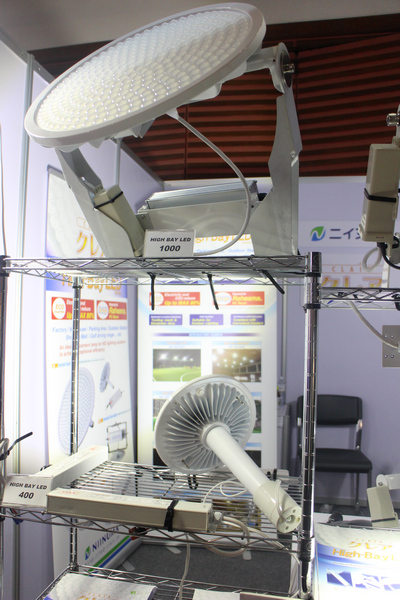 |
|
Niinuma's 1,000W high bay LED lights weigh only 6 kilograms due to special material design. (LEDinside) |
The company's high bay lights are designed with separated LED drivers. “As we all know LED drivers tend to break down before the actual LED chips do, so we thought why make an all-in-one product, which would require the replacement of the entire luminaire,” said Hung. The design has sparked inquiries from competitors at the trade show, such as from Nex Inotec, who proposed a partnership, he added.
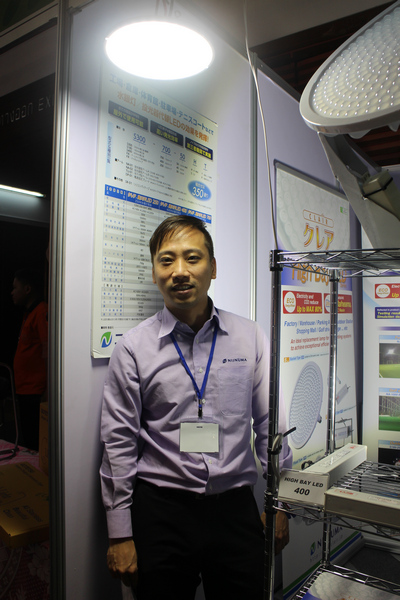 |
|
Gary Hung, Branch Manager, Niinuma stands under the company's high bay LED lights. (LEDinside) |
Toyoda Gosei chips are used in the product design, which gives the products a minimum luminous efficacy of 110 lm/w to 120 lm/w, and a lighting range of 100 meters in height. With a standard beam angle of 80 degrees, the products can be customized to meet client needs, explained Hung.
The company which has just launched its business strategy in the Southeast Asia market recently, is promoting high bay lights in the oversea market. Niinuma is relying on two to three distributors in Thailand to sell its products, but has no intention on showcasing the products in China or Taiwan anytime soon. “Taiwanese and Chinese competitors learn and copy product designs really fast,” explained Hung.
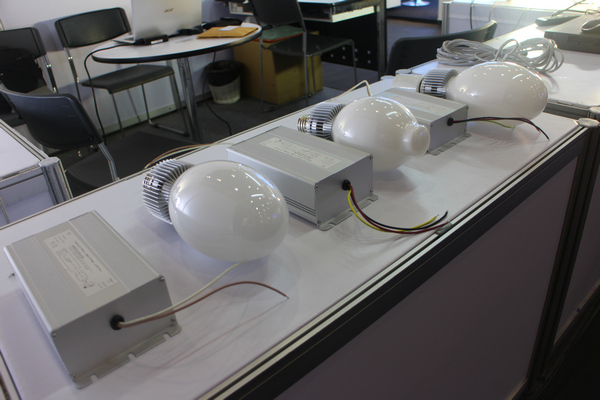 |
|
Masamitsu's induction lamps displayed at EcoLightTech Asia 2014. (LEDinside) |
Niche market strategies
Another Japanese manufacturer Masamitsu, which has been in the Thai LED market for almost two years is targeting niche lighting market. The company has only sent product samples to potential clients in Thailand, and is still in the process of networking, explained Robert Hung, General Manager, Taiwan Operation, Masamitsu. The company’s booth was barren of posters to advertise its products, showing its low-key approach in the Thai LED market.
Masamitsu solely offers customized products and focuses its services on redesigning LED drivers for local Thai LED manufacturers. “Our company does not mass produce products for general lighting applications,” said Hung.
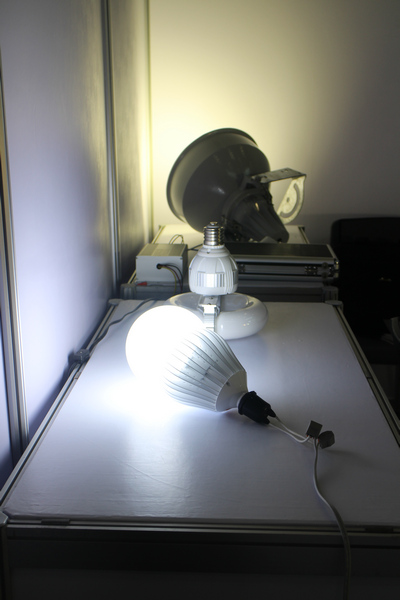 |
|
Induction lamps are very bright and nearly four times brigher than traditional mercury-vapor lamps, said Robert Hung, General Manager, Taiwan Operation, Masamitsu. (LEDinside) |
Contrary to most companies choice of highlighting LED products at the trade show, the company featured induction lamps at its booth. Masamitsu offers high wattage 100 W to 200 W induction lamps, which are equivalent to 400 W to 800 W in traditional mercury-vapor lamps, explained Hung. The lamps have a lifetime of 100,000 hours, and are brighter and less costly than LEDs. At this stage, the company has decided to test the waters in Thai LED market with these products.
Japanese manufacturers strategies in the Thai market share many similarities, and whether the overlapping strategies will pose particular obstacles for these manufacturers to thrive in the local market requires further observations.
(Author: Judy Lin, Chief Editor, LEDinside)




















